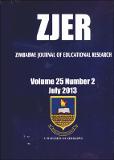| dc.contributor.author | Mapolisa, Tlichaona | |
| dc.contributor.author | Mhlanga, Ephraim | |
| dc.contributor.author | Chabvonga, Nelson | |
| dc.contributor.author | Chimhwadzwa, Zvinaiye | |
| dc.coverage.spatial | Zimbabwe. | en |
| dc.date.accessioned | 2016-03-15T14:59:03Z | |
| dc.date.available | 2016-03-15T14:59:03Z | |
| dc.date.issued | 2013-07 | |
| dc.identifier.citation | Mapolisa, T. et al., (2013) Female leadership dilemmas in primary schools: a case study of primary schools in Harare province in Zimbabwe, Zimbabwe Journal of Educational Research, vol. 25, no.2, pp. 261- 277. Harare: HRRC. | en |
| dc.identifier.issn | 1013-3445 | |
| dc.identifier.uri | https://opendocs.ids.ac.uk/opendocs/handle/20.500.12413/10065 | |
| dc.description | A qualitative research on challenges faced by female school managers in school management at primary school level in Zimbabwe. | en |
| dc.description.abstract | The study sought to explore dilemmasfaced by female school leaders in primary schools in Kambuzuma, Warren Park and Kuwadzana areas of Harare Province in Zimbabwe. The study was largely rooted in a qualitative research paradigm. It made use of a case study research design. The study's population was drawn from 18 primary schools in the studied areas. It made use of a conveniently stratified sample of 15 research participants comprising five female heads, one male deputy head and five female teachers-in-charge (TICs). The sample was drawn from five primary schools that had a predominantly female leadership. The data that the participants generated was ranked and coded using numbers one to ten to suit the emergent design. Firstly, the study found out that married female school leaders faced the dilemma ofchoosing between marriage and their leadership career. Secondly, the research participants faced a dilemma of negative societal attitudes towards them. Thirdly, female school leaders lacked the support of other fellow female subordinates.
The study recommends the Public Service Commission should not promote women for the sake of promotion but should do so on the grounds of merit and seniority. Furthermore, female school heads need to work very hard and prove that they are worthy to occupy those posts so that male bosses will change their 'unspoken' corporate cultures of discrimination against female school leaders. | en |
| dc.language.iso | en | en |
| dc.publisher | Human Resource Research Centre (HRRC), University of Zimbabwe (UZ) | en |
| dc.rights.uri | http://creativecommons.org/licenses/by-nc-nd/3.0/ | en |
| dc.subject | Education | en |
| dc.subject | Gender | en |
| dc.title | Female leadership dilemmas in primary schools: a case study of primary schools in Harare province in Zimbabwe | en |
| dc.type | Article | en |
| dc.rights.holder | University of Zimbabwe (UZ) | en |


